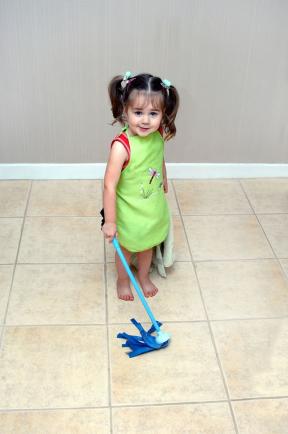
In previous centuries, children were an important part of a family's labor force. They helped in stores, on farms and ranches, and in factories. Although in many countries, times have changed, and most children go to school rather than work, children can still be a valuable asset to a household. They also learn important life skills by participating regularly in household jobs. Here are seven chores your children should be doing in your home.
1. Clean up time
Start by expecting your children to care for their belongings. Give your children responsibility to clean up their own messes. As they clean up the messes they make, they will learn to respect their things and pick up after themselves. Of course, I'm still hoping the lesson takes hold for some of my children.
To encourage them, I often call my kids back to the table if they've left their dishes. I also expect them to clean up after themselves in common family living spaces while allowing them to be messier in their own bedrooms. Even toddlers can learn to clean up their toys, and they even think it's fun.
2. Help with siblings
Caring for siblings helps children learn compassion, patience and love. Assign your 4-year-old to make funny faces at the baby or sing songs while you make a phone call. A 6-year-old can play games and make believe with younger children. Older grade school children can read stories and learn to babysit. My oldest daughter is almost 13. We rely on her to watch her siblings a few times a month as part of her contribution to our household.
Children should never be left unattended without a responsible, trained person to care for them. Make sure you teach your children about emergencies and always leave them a contact number.
3. Make your bed
I know many people don't make their beds daily, but I think a made bed makes a bedroom look tidy and deters messes. Children can begin to make their beds daily starting around age 5. By age 8, they can change sheets with assistance. By age 10, I have my children change their own sheets. I may be tough about making beds, but I've heard too many horror stories about sheets going unwashed for a whole semester of college.
4. Dishes
As a family grows, so does the number of dishes used daily. Recruit your children to help out, so you're not stuck at the sink all day. Toddlers can help unload the dishwasher (with very close supervision). My children are assigned to help with kitchen jobs like cooking, setting the table and doing the dishes. Learning the proper way to load a dishwasher, hand wash pots and pans and clean counters will be useful for your children throughout their lives.
5. Pack lunch
If you're spending time each evening or morning making your children's lunches, it's time to pass the job on to them. This FamilyShare article will help you get started. When children pack their own lunches, they learn to make healthy choices that will help them be successful all day. They also take pride in their own health and might even become interested in cooking.
6. Special jobs
Kids are great at doing jobs that are difficult for adults, like cleaning baseboards. Tweens can be good at organizing, so have them clean out drawers and toy bins. I have my kids wipe down doorknobs and light switches, empty garbage cans and sweep floors. Small children can shake rugs and help dust. Expect your children to participate in family cleanup projects like yard work. Sometimes jobs done less often, like dusting blinds, can even seem fun.
7. Laundry
Before your kids leave home, they need to know how to do laundry. If they are careless with their own clothing, have them launder it themselves. Toddlers love to sort socks and carry laundry. Young children can fold towels and easier items, and kids 8 and up can do laundry all by themselves, with occasional help. I do all of my family's laundry, but the children help in various ways.
Learning to work is a lesson best learned at home and repeated in other areas of life. Share the burden of household jobs and management, and prepare your children for life as adults, by having your children help with chores. They might whine about it now, but they'll thank you later.

